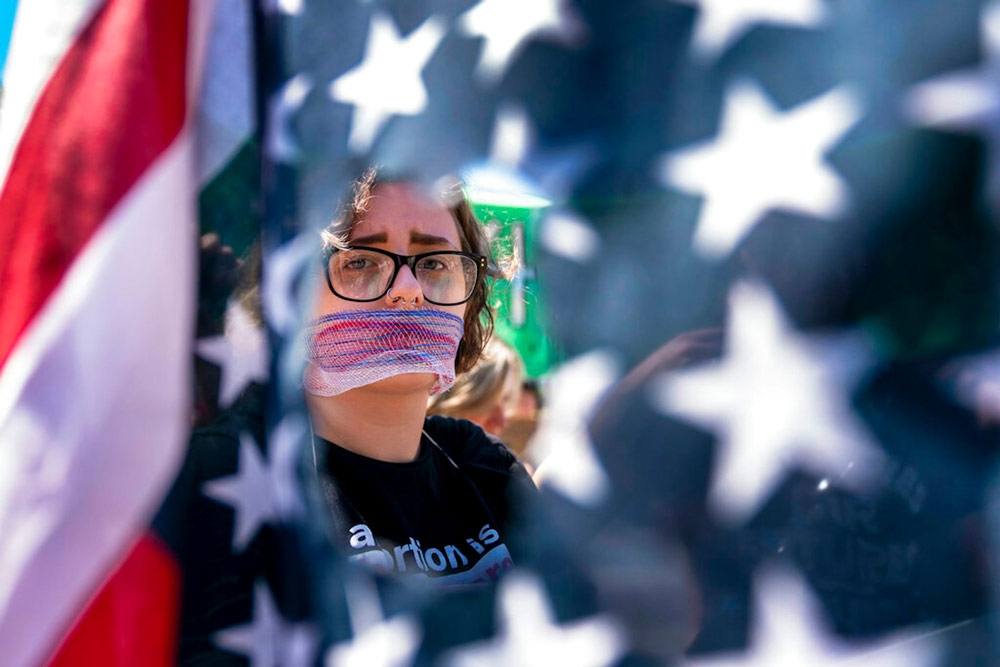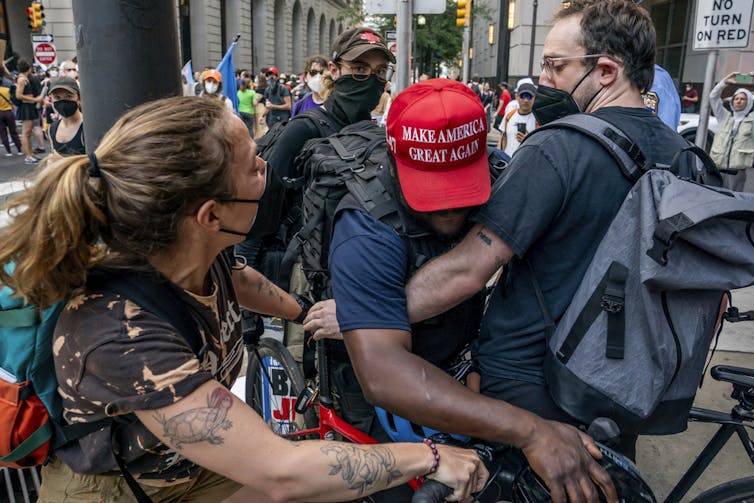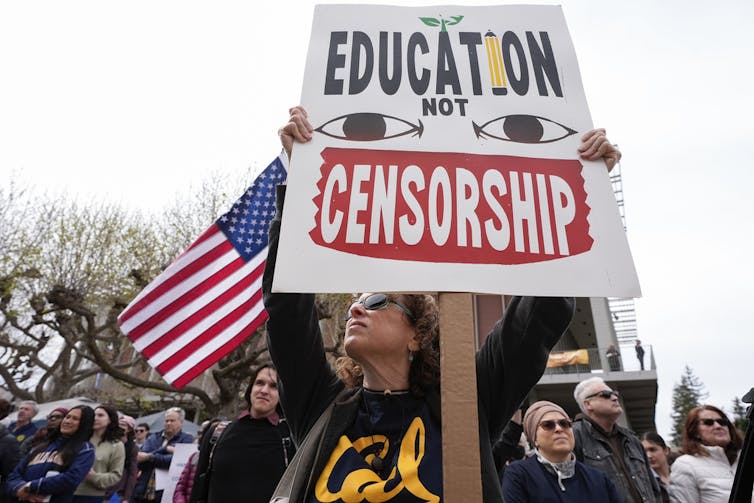
By James L. Gibson
For decades, Americans’ trust in one another has been on the decline, according to the most recent General Social Survey.
A major factor in that downshift has been the concurrent rise in the polarization between the two major political parties. Supporters of Republicans and Democrats are far more likely than in the past to view the opposite side with distrust.
That political polarization is so stark that many Americans are now unlikely to have friendly social interactions, live nearby or congregate with people from opposing camps, according to one recent study.
Social scientists often refer to this sort of animosity as “affective polarization,” meaning that people not only hold conflicting views on many or most political issues but also disdain fellow citizens who hold different opinions. Over the past few decades, such affective polarization in the U.S. has become commonplace.
Polarization undermines democracy by making the essential processes of democratic deliberation – discussion, negotiation, compromise and bargaining over public policies – difficult, if not impossible. Because polarization extends so broadly and deeply, some people have become unwilling to express their views until they’ve confirmed they’re speaking with someone who’s like-minded.
I’m a political scientist, and I found that Americans were far less likely to publicly voice their opinions than even during the height of the McCarthy-era Red Scare.

AP Photo/Nathan Howard
The muting of the American voice
According to a 2022 book written by political scientists Taylor Carlson and Jaime E. Settle, fears about speaking out are grounded in concerns about social sanctions for expressing unwelcome views.
And this withholding of views extends across a broad range of social circumstances. In 2022, for instance, I conducted a survey of a representative sample of about 1,500 residents of the U.S. I found that while 45% of the respondents were worried about expressing their views to members of their immediate family, this percentage ballooned to 62% when it came to speaking out publicly in one’s community. Nearly half of those surveyed said they felt less free to speak their minds than they used to.
About three to four times more Americans said they did not feel free to express themselves, compared with the number of those who said so during the McCarthy era.
Censorship in the US and globally
Since that survey, attacks on free speech have increased markedly, especially under the Trump administration.
Issues such as the Israeli war in Gaza, activist campaigns against “wokeism,” and the ever-increasing attempts to penalize people for expressing certain ideas have made it more difficult for people to speak out.
The breadth of self-censorship in the U.S. in recent times is not unprecedented or unique to the U.S. Indeed, research in Germany, Sweden and elsewhere have reported similar increases in self-censorship in the past several years.
How the ‘spiral of a silence’ explains self-censorship
In the 1970s, Elisabeth Noelle-Neumann, a distinguished German political scientist, coined the term the “spiral of silence” to describe how self-censorship arises and what its consequences can be. Informed by research she conducted on the 1965 West German federal election, Noelle-Neumann observed that an individual’s willingness to publicly give their opinion was tied to their perceptions of public opinion on an issue.
The so-called spiral happens when someone expresses a view on a controversial issue and then encounters vigorous criticism from an aggressive minority – perhaps even sharp attacks.

AP Photo/Godofredo A. Vásquez
A listener can impose costs on the speaker for expressing the view in a number of ways, including criticism, direct personal attacks and even attempts to “cancel” the speaker through ending friendships or refusing to attend social events such as Thanksgiving or holiday dinners.
This kind of sanction isn’t limited to just social interactions but also when someone is threatened by far bigger institutions, from corporations to the government. The speaker learns from this encounter and decides to keep their mouth shut in the future because the costs of expressing the view are simply too high.
This self-censorship has knock-on effects, as views become less commonly expressed and people are less likely to encounter support from those who hold similar views. People come to believe that they are in the minority, even if they are, in fact, in the majority. This belief then also contributes to the unwillingness to express one’s views.
The opinions of the aggressive minority then become dominant. True public opinion and expressed public opinion diverge. Most importantly, the free-ranging debate so necessary to democratic politics is stifled.
Not all issues are like this, of course – only issues for which a committed and determined minority exists that can impose costs on a particular viewpoint are subject to this spiral.
The consequences for democratic deliberation
The tendency toward self-censorship means listeners are deprived of hearing the withheld views. The marketplace of ideas becomes skewed; the choices of buyers in that marketplace are circumscribed. The robust debate so necessary to deliberations in a democracy is squelched as the views of a minority come to be seen as the only “acceptable” political views.
No better example of this can be found than in the absence of debate in the contemporary U.S. about the treatment of the Palestinians by the Israelis, whatever outcome such vigorous discussion might produce. Fearful of consequences, many people are withholding their views on Israel – whether Israel has committed war crimes, for instance, or whether Israeli members of government should be sanctioned – because they fear being branded as antisemitic.
Many Americans are also biting their tongues when it comes to DEI, affirmative action and even whether political tolerance is essential for democracy.
But the dominant views are also penalized by this spiral. By not having to face their competitors, they lose the opportunity to check their beliefs and, if confirmed, bolster and strengthen their arguments. Good ideas lose the chance to become better, while bad ideas – such as something as extreme as Holocaust denial – are given space to flourish.
The spiral of silence therefore becomes inimical to pluralistic debate, discussion and, ultimately, to democracy itself.
![]()
James L. Gibson is Sidney W. Souers Professor of Government at Washington University in St. Louis.





























JimboXYZ says
Can it be traced back to “Cancel Culture” & any spin on what anyone has to voice publicly ? Some folks hear what they wanna hear. What was the old saying. “Don’t trust anyone over 30 ?” And when those 30 & younger lie to you, who does that leave ? The new phrase becomes “Trust No One.” One has to be wary of what another’s true motive(s) is(are). End of the day, the silent majority, everyone gets one vote, vote for what’s in your best interest, otherwise you’ll be fighting that advantage that you gave another over you with a vote. Everyone is competing and it’s obvious that there isn’t enough to go around, not everyone is the winner, more losers than winners in life. And there are no shortages of those that won’t cheat, even when they are standing in front of you telling you they are for you. That starts in grade school, does anyone actually think that those types ever change or get religion ? We all need to relatively insulate ourselves, there’s a healthy dose of that vs being an unhealthy paranoia for isolationism.
Deborah Coffey says
For sure. And, that is the intent of the wannabe dictator’s largest masked police force…ICE…showing it cares nothing for laws, the courts, and human rights. Trump’s police state has arrived. Call Hospice for the United States of America.
Laurel says
Okay, Trump supporters, how do we communicate with you when the simple question “Why do you like Trump” literally sends you running out the door? Then, the spouse, who was originally asked the question, not the dodger, states “Look what you made him do now!”
Explain to me why you state “Trump won, get over it” yet I still see Trump flags in your yard? Never saw that before. All flags, bumper stickers and yard signs used to come down after an election. It seems you haven’t gotten over it.
How do I talk to someone who has a car sticker that states “Are you an American, or a Democrat?” As an Independent, the driver looks to me like someone who is not too bright, and full of hate.
What am I to think of a person who is okay with the President of the United States:
Is a 34 count convicted felon.
Is an adjudicated rapist.
Says about women “grab ’em by the pussy.”
Sells made in China garbage to naive people.
Can easily be bought.
Lies daily.
Mocks a man with palsy.
Pretends to give a microphone a blow job.
Rounds up people with masked, unmarked agents and sends them to foreign countries.
Accepts $400million dollar bribes.
Threatens to deport Americans.
Pardons groups of convicted felons.
Wishes a pedophile well.
Surrounds himself with unqualified ass kissers.
Tries to strong arm the world for his own satisfaction.
What surprises me about you is:
You believe him.
You either can’t read body language, or you ignore it.
You cannot seem to understand when someone is blatantly lying to you.
You don’t like coastal elites, but voted for one, and you believe he will help you.
You are okay with him going after your money to make rich people richer.
You are okay with him taking food out of children’s mouths.
You keep making excuses for the inexcusable.
You think he is God like.
You think Jesus, your savior, supports hatred and sits with him in court.
You are completely okay with unknown people who extract your personal data.
You do not see the obvious parallel with Trump and other authoritarian leaders.
You believe the most powerful man in the world is a constant victim as he claims.
You believe the party of jobs, jobs, jobs is great for firing thousands of Americans.
You do not see the not so slow boil of the implosion of our country. Make America Great Again? It was never like this, not for the general public. It has had bad moments, but we got through them. Why go there again and call it “Great?” Suppression of people is great?
I could go on and on, but you, to me, seem like you are hardwired to hate. You appear (and have written about) being gleeful when your fellow Americans are upset. That somehow, you have won. Maybe you should admit it’s all about retaliation of your perception of victimization? Instead of retaliation of those corporate enterprises, and selfish grifters, that take advantage of you, they have successfully turned you on your neighbors or family members? That the current administration is about controlling you?
It’s like talking to a wall. Sorry, but that’s how it feels. Like talking to people deep in a cult, easily identified by their red hats, or their red ties and blue suits. Look at Rubio! He looks like he well knows he sold his soul. Look at Hegseth. He looks like a puppy that crapped on the floor. Look at Laura Loomer. She looks like someone who is gleefully rolling in truly undeserved power. Look at Marjorie Taylor Green, dumb as a rock, and wallowing in the attention she so craves. Look at Karoline Leavitt, spouting nastiness with the doorknocker cross on her chest. Look at unelected Elon Musk, oh never mind.
Seriously?
It’s an unbelievable shit show, and you are busy making excuses for it. How do I talk to that?
Laurel says
I don’t talk to that. It’s not self censorship, it’s self preservation. You want to fulfill a narcissist’s needs, go ahead. It’s at your expense, as well as those who don’t care to join in.
It’s on you.
Reasonable Voices says
@ Laurel I understand you’re frustrated with the political situation and feeling like communication has broken down. That frustration is real and valid.
But I think there’s a disconnect here. You’re asking ‘How do I talk to Trump supporters?’ while simultaneously describing them in ways that make clear you’ve already written them off as cult members, hateful, and stupid.
If someone approached you with that level of contempt already baked in, how would you respond? Most people – regardless of their politics – would probably walk away too.
The challenge isn’t that Trump supporters are uniquely unreachable. It’s that political conversations have become so toxic that people on all sides are retreating. When we lead with accusations and moral superiority rather than genuine curiosity, we guarantee the conversation will fail.
Instead of asking ‘Why do you like Trump?’ with the subtext of ‘so I can explain why you’re wrong,’ what if we asked with genuine interest in understanding their experience? What problems do they see Trump addressing? What concerns drive their choices?
You don’t have to agree with their answers. But if the goal is actually communication rather than venting, we have to start from a place of basic respect for their humanity – even when we strongly disagree with their choices.
The research shows that when we approach political conversations as battles to be won rather than puzzles to be understood, everyone loses. Democracy needs people who disagree to still be able to talk to each other. That starts with how we show up to the conversation.